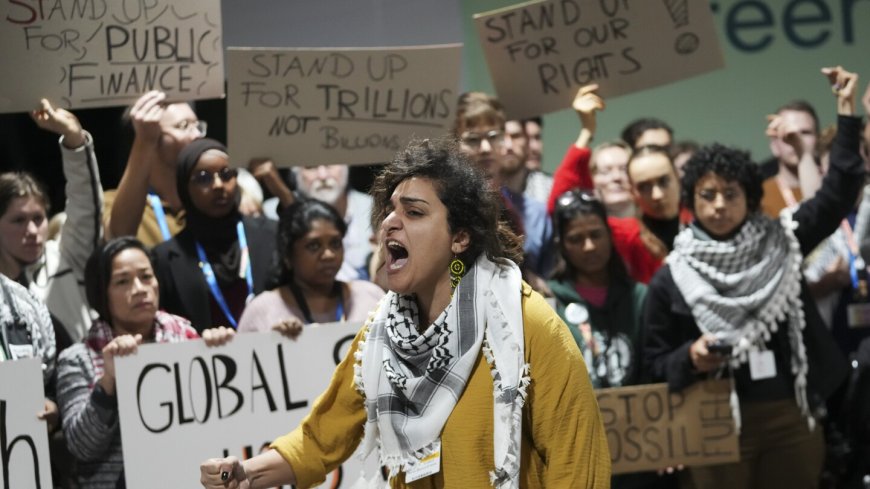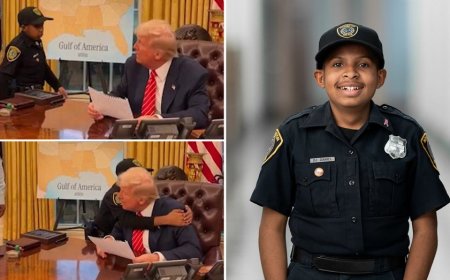Negotiators work through the night at UN climate talks to try to reach a cash deal for poor nations
BAKU, Azerbaijan (AP) — The United Nations' annual climate talks pushed into overtime Saturday under a cloud of anger and disappointment as negotiators were well short of a deal on money for developing nations to curb and adapt to climate change.A draft of the final agreement Friday pledged $250 billion annually by 2035, more than double the previous goal of $100 billion set 15 years ago but far short of the annual $1 trillion-plus that experts say is needed. Through the early hours of Saturday morning, The Associated Press saw lead negotiators from the European Union, the United States and other nations going through the empty halls from meeting to meeting as delegates tried to hash out a new version of the deal.“We're still working hard,” U.S. climate envoy John Podesta told the AP past 4 a.m. local time. And by late Saturday morning, he and other delegations said talks on a new deal were still ongoing.Alden Meyer, of the European think tank E3G, said negotiators now have very little room for error.“They’ve got to make sure whatever they put on the table is something that can fly. ... Because otherwise we start to lose critical mass as ministers start to leave tonight and into tomorrow,” Meyer said. “So, they are under a deadline, but this is when it gets real.”The climate talks, called COP29, in Baku, Azerbaijan, were scheduled to end Friday. Workers have already begun dismantling the venue for the talks. A climate cash deal is still elusiveWealthy nations are obligated to help vulnerable countries under an agreement reached at these talks in Paris in 2015. Developing nations are seeking $1.3 trillion to help adapt to droughts, floods, rising seas and extreme heat, pay for losses and damages caused by extreme weather, and transition their energy systems away from planet-warming fossil fuels and toward clean energy. Representatives of some of the nations that are obliged to contribute the cash said the $250 billion climate finance figure is realistic and reflects their limits at a time when their own economies are stretched. But on Saturday morning, Irish environment minister Eamon Ryan said that he felt there'll be a new number in the next draft."We’ll have to see what the final number is. I don’t think it’ll be the one initially published yesterday," Ryan said. “But it’s not just that number — it's how do you get to 1.3 trillion."Ryan said that any number reached at the COP will have to be supplemented with other sources of finance, for example through a market for carbon emissions where polluters would pay to offset what they emit. The amount in any deal reached at COP negotiations — often considered a “core” — will then be mobilized or leveraged for greater climate spending. But much of that means loans for countries drowning in debt.“We have to get agreement quickly. And I hope and believe we can,” Ryan said.Vulnerable nations, many already battered by extreme weather made worse largely by emissions from the burning of fossil fuels they've had little to do with were angered by the draft text published on Friday. “Developed countries must commit trillions, not empty promises," said Harjeet Singh, Director for the Fossil Fuel Non-Proliferation Treaty Initiative. "Anything less makes them squarely responsible for the failure of these talks and the betrayal of billions across the globe.”Meyer of E3G said it’s still up in the air whether a deal will come out of Baku at all.“It is still not out of the question that there could be an inability to close the gap on the finance issue,” he said. “That obviously is not an ideal scenario.”Activists push for more ambitious dealSeveral dozen activists marched in silence outside the halls where delegates meet late Friday, raising and crossing their arms in front of themselves to indicate rejection of the draft text.Also late Friday, 355 civil society organizations released a letter in support of the G77 and China negotiating group’s rejection of the latest draft.The letter urged negotiators to “stand up for the people of the Global South," saying that “no deal in Baku is better than a bad deal.”Lidy Nacpil, a Filipino coordinator with the Asian Peoples’ Movement on Debt and Development, said activists would still be unhappy if the climate finance number doubles to $500 billion.“We’re still at this point where we are asking developing countries to stay strong and not just give in to far, far less than what should be,” she said.With bleary eyes, seated around cold pizza, a group of youth activists chatted to keep each other awake through the early hours of Saturday in one of the main halls of the venue. “All of us are kind of in mourning in a way,” said Jessica Dunne, with the Alliance of Non-Governmental Radical Youth. But the group said being in community eases the painful emotions that come with a process Dunne called an “abject failure.”“In these halls tonight, as we’re sitting here and we’re talking and we’re dancing and crying and laughing, it kind of gives you

BAKU, Azerbaijan (AP) — The United Nations' annual climate talks pushed into overtime Saturday under a cloud of anger and disappointment as negotiators were well short of a deal on money for developing nations to curb and adapt to climate change.
A draft of the final agreement Friday pledged $250 billion annually by 2035, more than double the previous goal of $100 billion set 15 years ago but far short of the annual $1 trillion-plus that experts say is needed. Through the early hours of Saturday morning, The Associated Press saw lead negotiators from the European Union, the United States and other nations going through the empty halls from meeting to meeting as delegates tried to hash out a new version of the deal.
“We're still working hard,” U.S. climate envoy John Podesta told the AP past 4 a.m. local time. And by late Saturday morning, he and other delegations said talks on a new deal were still ongoing.
Alden Meyer, of the European think tank E3G, said negotiators now have very little room for error.
“They’ve got to make sure whatever they put on the table is something that can fly. ... Because otherwise we start to lose critical mass as ministers start to leave tonight and into tomorrow,” Meyer said. “So, they are under a deadline, but this is when it gets real.”
The climate talks, called COP29, in Baku, Azerbaijan, were scheduled to end Friday. Workers have already begun dismantling the venue for the talks.
Wealthy nations are obligated to help vulnerable countries under an agreement reached at these talks in Paris in 2015. Developing nations are seeking $1.3 trillion to help adapt to droughts, floods, rising seas and extreme heat, pay for losses and damages caused by extreme weather, and transition their energy systems away from planet-warming fossil fuels and toward clean energy.
Representatives of some of the nations that are obliged to contribute the cash said the $250 billion climate finance figure is realistic and reflects their limits at a time when their own economies are stretched.
But on Saturday morning, Irish environment minister Eamon Ryan said that he felt there'll be a new number in the next draft.
"We’ll have to see what the final number is. I don’t think it’ll be the one initially published yesterday," Ryan said. “But it’s not just that number — it's how do you get to 1.3 trillion."
Ryan said that any number reached at the COP will have to be supplemented with other sources of finance, for example through a market for carbon emissions where polluters would pay to offset what they emit.
The amount in any deal reached at COP negotiations — often considered a “core” — will then be mobilized or leveraged for greater climate spending. But much of that means loans for countries drowning in debt.
“We have to get agreement quickly. And I hope and believe we can,” Ryan said.
Vulnerable nations, many already battered by extreme weather made worse largely by emissions from the burning of fossil fuels they've had little to do with were angered by the draft text published on Friday.
“Developed countries must commit trillions, not empty promises," said Harjeet Singh, Director for the Fossil Fuel Non-Proliferation Treaty Initiative. "Anything less makes them squarely responsible for the failure of these talks and the betrayal of billions across the globe.”
Meyer of E3G said it’s still up in the air whether a deal will come out of Baku at all.
“It is still not out of the question that there could be an inability to close the gap on the finance issue,” he said. “That obviously is not an ideal scenario.”
Several dozen activists marched in silence outside the halls where delegates meet late Friday, raising and crossing their arms in front of themselves to indicate rejection of the draft text.
Also late Friday, 355 civil society organizations released a letter in support of the G77 and China negotiating group’s rejection of the latest draft.
The letter urged negotiators to “stand up for the people of the Global South," saying that “no deal in Baku is better than a bad deal.”
Lidy Nacpil, a Filipino coordinator with the Asian Peoples’ Movement on Debt and Development, said activists would still be unhappy if the climate finance number doubles to $500 billion.
“We’re still at this point where we are asking developing countries to stay strong and not just give in to far, far less than what should be,” she said.
With bleary eyes, seated around cold pizza, a group of youth activists chatted to keep each other awake through the early hours of Saturday in one of the main halls of the venue.
“All of us are kind of in mourning in a way,” said Jessica Dunne, with the Alliance of Non-Governmental Radical Youth. But the group said being in community eases the painful emotions that come with a process Dunne called an “abject failure.”
“In these halls tonight, as we’re sitting here and we’re talking and we’re dancing and crying and laughing, it kind of gives you hope that there will be another day that we’re going to fight for,” she said.
___
Associated Press journalists Ahmed Hatem, Aleksandar Furtula and Joshua A. Bickel contributed to this report.
___
The Associated Press’ climate and environmental coverage receives financial support from multiple private foundations. AP is solely responsible for all content. Find AP’s standards for working with philanthropies, a list of supporters and funded coverage areas at AP.org.


























































